How about a plate of brain foods to boost your mood? Yes, please.
We all know how winter depression can set in. There are many factors in life that can cause you to feel sad, blue, and downright, lousy.
One thing I do that helps is setting smart goals. Another good way to combat the depression is to consume foods that boost mood function. And without further ado, let’s get right to it.
Here is a list of widely researched brain foods that boost your mood.
1. Honey (Polyphenols)
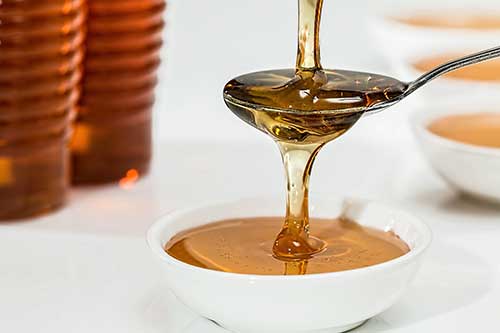
Honey is one of the most powerful natural brain foods in nature. In fact, it’s the only insect-derived natural product with therapeutic, nutritional, and industrial value (1).
It’s a sweet substance, packed with beneficial physiologically active organic compounds such as polyphenols. Quercetin and kaempferol are two of them. They are known to reduce inflammation and to protect the brain from oxidative stress, helping to prevent depression (2).
Where does honey come from?
Honey is formed by the nectar of flowers by honeybees. It has been used for its nutritional and medicinal properties since civilization appeared about 5,500 years ago (3).
Not only does honey balance your antioxidant defensive system, but its polyphenols produce memory-enhancing effects on the molecular level. Pretty cool!
Honey is awesome. It’s truly a gift from nature—the most exquisite of brain foods. It also happens to be one of the powerful immune-boosting foods.
However, Consume honey in moderation.
Honey has a glycemic index (GI) rating of 58, whereas sugar ranks at 60. This means honey will still spike your blood glucose level similar to sugar.
The low GI fructose content in honey is what makes it a good substitute for sugar. But its high GI glucose content will overall, still cause a spike in blood sugar (4).
As a type 1 diabetic, I’ve learned my lesson with honey. Still, the benefits far outweigh the con of its sugar content. I always put it in hot tea.
Try Gustare Australian Yellow Box Honey. Its glycemic index ranks at 35, so you get the best of both worlds!—less blood sugar spikes and a mood boost.
2. Asparagus (Tryptophan & Folate)
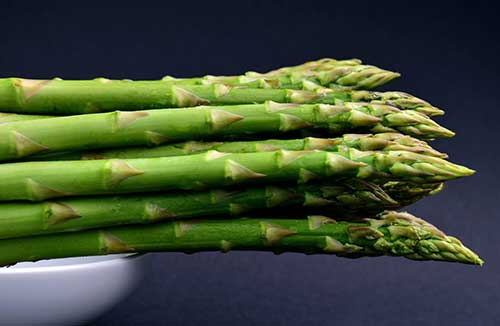
Asparagus is one of those vegetables that you either love or hate. You should love them.
Why? Because they boost your energy, cleanse your urinary system, and are packed with tryptophan, an amino acid used to synthesize serotonin. This is a neurotransmitter responsible for the modulation of mood and cognition (5).
And not only is asparagus a great source of potassium and fiber, but it is high in folate—an essential B-vitamin. Low levels of folate are linked to depression and chronic anxieties (6).
Do you hate your job? No worries! Whip up a batch of asparagus, turn on some music, and start dancing to ease your mind!
3. Grapes (Resveratrol)

Grapes are packed with powerful antioxidants that can help ward off depression.
They contain compounds such as dihydrocaffeic acid (DHCA) and malvidin-3′-O-glucoside (Mal-gluc). DHCA and Mal-gluc have been studied to have anti-depressant effects by inhibiting peripheral inflammation and modulating synaptic plasticity in the brain (7).
What is the best grape to boost your mood?
Concord and purple grapes have significantly more antioxidants than green and red grapes. This is due to their higher number of anthocyanins—flavonoid pigments that give them their dark color (8)(9).
Most of these antioxidants are located in the skin of the dark grapes, so don’t peel the skin!
What is the grape with the most antioxidants?
The purple Malbec grape! It has the thickest skin and the highest amount of resveratrol. This is a polyphenol studied to be a promising candidate for the treatment of depression and anxiety (10).
So, what does all this grape talk mean for you and promoting a better mood?
Well, it’s a hint that you should sit back on the coach, kick up your feet, and pop a few Malbec grapes in your mouth. Although, in reality, you will benefit from any type.
You could also throw a glass of wine into the mix. Really, any wine will do.
4. Greek Yogurt (Probiotic)
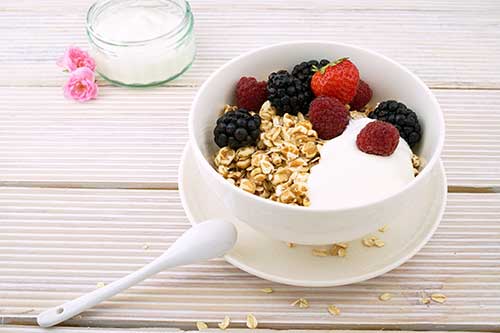
How about a big bowl of Greek yogurt for breakfast? Count me in.
This is yet another of the powerful brain foods. Greek yogurt is known to have plenty of health benefits, mainly due to its probiotics—the good bacteria.
Studies show that the combination of Greek yogurt combined with exercise can reduce the risk of depression and anxieties by increasing serotonin (11).
The study also showed that triglyceride and high-sensitivity C-reactive protein (hs-CRP) levels were decreased. This implicates that frequently eating Greek yogurt and exercising can aid in the prevention of cardiovascular disease.
What’s the takeaway with greek yogurt and mood?
Instead of eating a bowl of high glycemic cereal for breakfast, consider a bowl of Greek yogurt and a quick morning jog.
The probiotics from the yogurt and increase in Vitamin-D from the exercise could work together to boost your mood.
5. white tea (Catechins)

There’s nothing better than a cup of white tea; any time of day, it doesn’t matter.
White tea is made from the Camellia sinensis plant. Similarly, green and black tea are made from the same plant, however, what differentiates them is how they are processed.
White tea is the least processed, and its leaves and buds are picked right before they fully open, yielding the most antioxidants of the teas (12).
Polyphenols are the most abundant antioxidant in white and green tea, specifically due to epigallocatechin gallate (EGCG). EGCG is a type of catechin and potent antioxidant that has positive effects on mood such as reduced stress (13).
Not to mention, both green and white tea contain lots of L-theanine, and caffeine. These have beneficial effects on attention, memory, and the suppression of distraction.
Personally, I drink 1-3 cups of white tea per day to boost my mood.
I can definitely feel the difference in my mental health. Sometimes I drink other teas like chamomile. It doesn’t have caffeine like green and white tea do, but it still calms me.
Another big reason I drink tea every day is because I’m type 1 diabetic, and that’s one of the ways to strengthen a diabetic heart.
What’s the perfect cup of tea?
There’s nothing better than a cup of the best white tea to boost your mood—with a spoon of honey, half a packet of sweetener, and a dab of milk.
6. Beets (Betanin & Tryptophan)
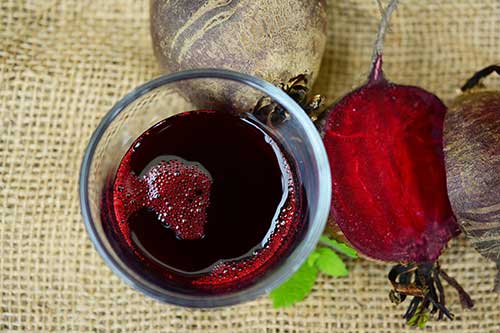
Good ol’ beets. They truly are the holy grail brain food of plants, or close to it.
Beets or beetroot, are the root portion of the beet plant. They come in a few different colors, although, you mainly see them as red in the supermarket.
They get their color from chemicals called betalains—potent antioxidants that play a similar role as the anthocyanins of grapes we discussed earlier.
Betanin is the most abundant betalain found in beetroot. Studies show it has anti-depressant effects, as well as being anti-cancerous. Not only this, but beets are packed with other excellent antioxidants such as rutin and caffeic acid which can reduce inflammation (14).
Like asparagus, beets have lots of the amino acid tryptophan, which, like mentioned earlier, increases serotonin—boosting your mood.
Beets are also one of the superfoods that reduce asthma symptoms and lung inflammation.
What’s the Best way to include beets in your diet?
Try organic beet juice! Or sprinkle a few slices of beetroot onto your salad.
7. Fatty fish (Omega-3 fatty acid)

Fish are awesome. Not only do they taste good (most of them), but they are very healthy for human consumption.
The oily fish such as sardines and salmon are an excellent source of omega-3 fatty acids. These are polyunsaturated fatty acids linked to playing roles in higher brain functioning that affect mood such as anti-depression (15).
There is still much research to be done regarding omega-3 fatty acids and mental health. But likewise, much research has already been done, and continues to be an important topic of study.
Here are a few brain foods rich in omega-3 fatty acids that could boost your mood:
- Wild Alaskan Salmon
- Mackerel
- Oysters
- Anchovies
- Walnuts
- Hemp Seed
- Flaxseeds
- Soybeans
- Canola Oil
- Seaweed
At the end of the day, you want a rich diet full of fatty acids and essential vitamins.
8. Nuts and Seeds (Tryptophan & Essential vitamins)
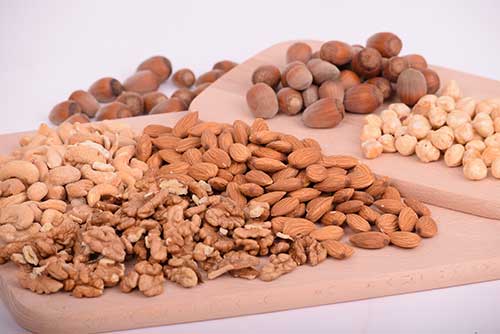
Nuts and seeds are packed with essential vitamins such as magnesium and zinc, as well as omega-3 fatty acids. These are known to combat anxiety, depression, and calm nerves.
Like beetroot and asparagus, nuts and seeds provide that handy-dandy mood boosting amino acid—tryptophan.
All nuts have minerals that can help promote a healthier mood, but there are a few that stand out.
Here are the most powerful nuts and seeds to boost your mood:
- Pistachios
- Almonds
- Cashews
- Walnuts
- Dark Chocolate [The higher the percent of cocoa the better. Raw cacao has even more antioxidants than regular dark chocolate—mainly catechin (like tea!). It also has methylxanthines such as caffeine and theobromine which are known to have very positive mood benefits (16)].
- Sesame Seeds (Very high in tryptophan)
- Pumpkin Seeds
The key to eating nuts and seeds isn’t to stuff a bunch in your mouth in one sitting, it’s to eat them consistently and often.
9. Cherry Tomatoes (Lycopene)
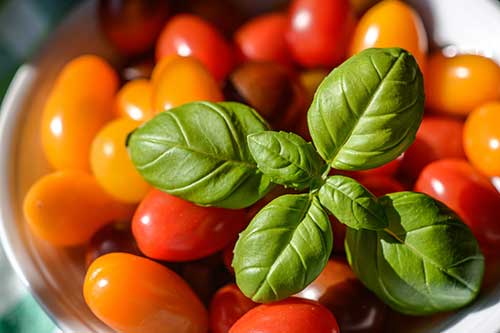
Tomatoes are an excellent source of lycopene—a naturally occurring fat-soluble carotenoid antioxidant that gives tomatoes their color. It also gives other red and pink fruits and vegetables their color, such as red carrots, watermelon, grapefruit, and papaya.
Studies show that lycopene can protect against oxidative stress-induced neuronal damage, helping to reduce depression and symptoms of anxiety (17).
Which tomato has the most lycopene to boost your mood?
Cherry tomatoes take first place of having the most lycopene content. Well, first as a group.
The Roma plum tomato actually has the highest concentration of lycopene out of all the tomatoes.
What’s the best way to prepare tomatoes to get the most lycopene?
There was a study performed on the tomato-based Mediterranean sofrito. It concluded that when cooking tomatoes and onions together, the lycopene Z-isomers became more bioavailable in the tomato product (18).
In other words, cooking tomatoes with onions increases the amount of antioxidants you are getting, specifically lycopene, and can help to give you a mood boost.
10. coffee (caffeine & Polyphenols)
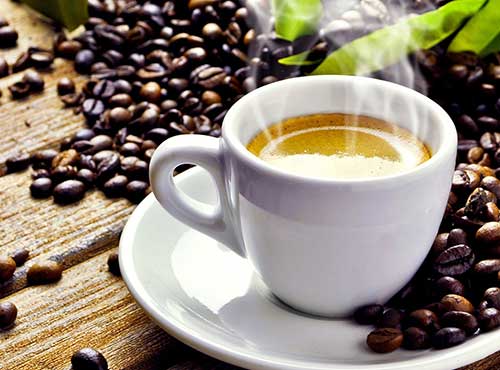
Coffee. Oh, coffee. We go way back, coffee and I. It’s a love-hate relationship.
Our beloved coffee has been widely-studied and proven to have many health benefits. It’s not so much a brain food as it is a…brain drink?
Amongst the most prominent antioxidants that coffee has is a stimulant you probably know very well, called caffeine. It’s the most consumed psychoactive substance in the world, and one of the only legal ones.
There are many studies that show caffeine’s effects on human health, such as triggering the release of neurotransmitters dopamine and norepinephrine. These can help to protect from the risks of depression and can boost your mood (19).
However, caffeine has a catch-22—it must be consumed in moderation.
One study showed that caffeine exaggerates sympathetic adrenal-medullary responses to stressful events in habitual adult coffee drinkers. They found that drinking coffee daily can cause repeated blood pressure elevation, increasing the risk for coronary heart disease (20).
A few side effects of caffeine on human health include:
- Insomnia
- Restlessness
- Can trigger GERD and acid reflux (by relaxing the lower esophageal sphincter)
- Anxiety
- Fast heartrate
Besides the side effects, caffeine is still a pretty awesome drug—er, stimulant.
Is decaffeinated coffee good for mood?
Yes! Besides having almost no caffeine, decaf has tons of antioxidants such as hydroxycinnamic acids and polyphenols (like honey!). Both of these antioxidants have been studied to be protective in nature regarding depression (21).
Decaf or not, a good ol’ cup of joe should do the trick.
And just like the ancient Greeks would say, Pan metron ariston (Everything in moderation).
Conclusion
There are many healthy foods that can boost your mood and mental clarity. Ultimately, you want to have a well-balanced diet, and always be seeking improvement: mentally, physically, and spiritually to have the healthiest mindset you can.
Here’s a quick recap of 10 Brain Foods that Boost your mood:
- Honey (Polyphenols)
- Asparagus (Tryptophan & Folate)
- Grapes (Resveratrol)
- Greek Yogurt (Probiotic)
- White Tea (Catechins)
- Beets (Betanin & Tryptophan)
- Fatty Fish (Omega-3 Fatty Acids)
- Nuts and Seeds (Tryptophan & Essential Vitamins)
- Cherry Tomatoes (Lycopene)
- Coffee (Caffeine & Polyphenols)
That’s all folks! Thanks for reading.
Feel free to comment below if you liked this article on 10 brain foods that boost your mood. I’d love to take questions or suggestions on other content you’d like to see on eHowdy!
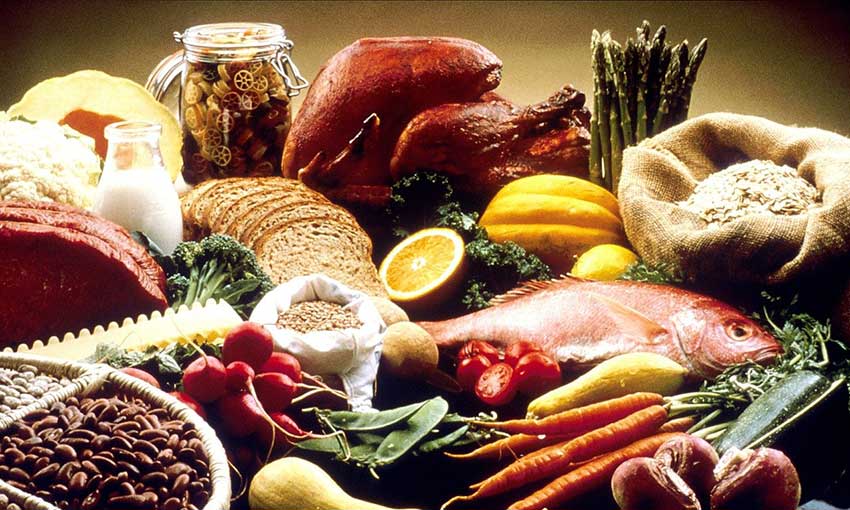
I can’t pilot beets or beet juice. I have paid high prices for organic beet juice but just can’t do it. But thank you for reminding me about some of these other superfoods.
BG
Yes, the beet is definitely an acquired taste. I take a few swigs every morning, and I love it. Thankfully, there’s so much more than just beets that can help you!